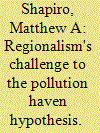| Srl | Item |
| 1 |
ID:
163554


|
|
|
|
|
| Summary/Abstract |
This paper examines how exposure to messages about the cause of seasonal air pollution in Korea influences the Korean public's satisfaction with efforts to address the problem. It also assesses the impact of frames that accentuate the costs and benefits of the nation's coal usage on individuals’ support for coal-based energy development. It draws from framing theory to develop hypotheses tested in two distinct survey experiments that recruited a representative sample of residents living in the Seoul Metropolitan area. We find that frames that highlight the need for immediate policy action, by blaming China, Korea or both nations, decreases satisfaction with existing national efforts. Moreover, frames that attribute blame exclusively to China decrease satisfaction with China's efforts to combat the problem. On the domestic front, we find that Koreans’ views toward increased coal use are a function of exposure to a coal-costs or coal-benefits frame; however, when the frames appear simultaneously in competition, considerations about the economic benefits overpower concerns about the negative health effects. The results emphasize how frames can shift perceptions about the need for policy action as well as in securing public support or opposition toward a specific “polluting” energy source.
|
|
|
|
|
|
|
|
|
|
|
|
|
|
|
|
| 2 |
ID:
175021


|
|
|
|
|
| Summary/Abstract |
Research on the politicization of science often highlights the role of the media or the effects of the public's prior beliefs. Less prominent are case studies addressing the direct communications from scientists working on a narrowly defined project. This paper introduces for consideration the United States Department of Energy-funded Joint Center for Energy Storage Research (JCESR), which fuses together basic research, battery design, and pathways to market. The central point is to assess whether, given its proximity to the climate change issue, JCESR's research has been politicized. Based on the results from interviews, observations, measures of public interest, and a survey of scientists working at JCESR, it is concluded that JCESR's next-generation battery research has avoided politicization and even thrived. This is attributed in part to bipartisan support among policy makers, the absence of any ideology-based impacts on beliefs about energy storage, and a perception among key actors that next-generation battery technology is not a pressing threat. JCESR also presents a collective ability to protect its scientific credibility while enhancing its political relevance. JCESR's battery storage research and development has been effectively buffered from the volatility of climate change.
|
|
|
|
|
|
|
|
|
|
|
|
|
|
|
|
| 3 |
ID:
127795


|
|
|
|
|
| Publication |
2014.
|
| Summary/Abstract |
This paper explores the phenomena of environmental coordination within Northeast Asia. I initially frame the discussion around claims that China is a pollution haven for its neighboring countries, and I look for evidence in the domestic and regional environmental institutions which challenge China's pollution haven status. I find that that there is a science and technology-based epistemic community in Northeast Asia which provides an important theoretical response to counter the pollution haven hypothesis. As well, given its strong science and technological output, Japan is poised to assume leadership of the Northeast Asian environmental regime for at least the short- to medium-term.
|
|
|
|
|
|
|
|
|
|
|
|
|
|
|
|